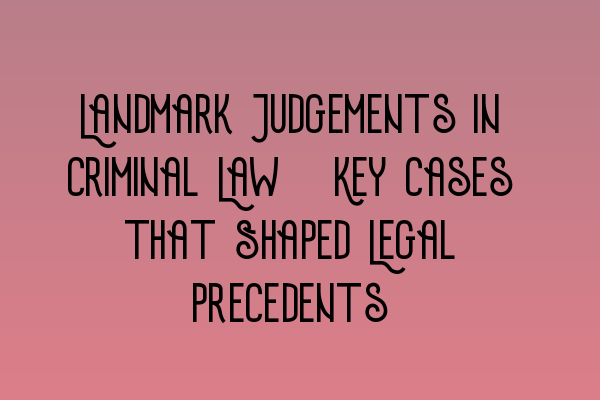Landmark Judgements in Criminal Law: Key Cases that Shaped Legal Precedents
As criminal lawyers, it is crucial for us to be familiar with landmark judgements that have shaped the legal landscape and set important precedents. These key cases not only provide insight into the interpretation and application of criminal law but also serve as valuable resources for legal practitioners and law students alike.
1. R v. Brown
The case of R v. Brown is a seminal judgement in the field of criminal law. This landmark decision explored the limits of consent in relation to acts of consensual violence and established the principle that certain activities can still be considered criminal even if all participants have consented. It is a case that has had a significant impact on the legal standards surrounding assault and bodily harm.
For more information about consent and criminal law, you can refer to our article on SQE 1 Practice Exam Questions.
2. R v. Woolin
R v. Woolin is another landmark judgement in criminal law, specifically in relation to the mens rea (mental element) of murder. This case introduced the concept of “virtual certainty” and clarified the interpretation of intention in criminal offenses. The ruling established that if death or serious injury was a virtual certainty as a result of the accused’s actions, then it could be inferred that the accused intended to cause that harm.
If you want to test your knowledge on mens rea and other criminal law concepts, you can access our SQE 1 Practice Mocks FLK1 FLK2 section.
3. R v. Jogee
R v. Jogee is a significant judgement that clarified the law concerning joint enterprise. This case overturned a previous ruling that had made it easier to convict individuals for the actions of others in a group. The Jogee decision emphasized the importance of proving the individual’s own intention and participation in the crime, rather than just presence or association. It has led to a reassessment of numerous cases where individuals were convicted under the old joint enterprise law.
If you are interested in learning more about joint enterprise and criminal liability, we offer comprehensive SQE 2 Preparation Courses that cover this topic in detail.
4. R v. Brown and Another
While R v. Brown (1993) focused on consent and violent acts, R v. Brown and Another (1997) revisited the issue in the context of consensual sexual acts between men. The latter case clarified the extent to which private sexual practices could be criminalized under the law. It highlighted the importance of individual autonomy and privacy in matters of personal relationships and sexual acts between consenting adults.
To learn more about sexual offenses and criminal law, you can explore our SQE 1 Preparation Courses.
5. R v. Cunningham
R v. Cunningham is a significant judgement that established the concept of “recklessness” in criminal law. This case clarified that a person can be held criminally liable if they consciously take an unjustifiable risk that could result in a prohibited consequence. The decision set the standard for determining whether an accused person’s behavior met the threshold of recklessness in various criminal offenses, including theft and assault.
If you are preparing for the SRA SQE exams, you may find our article on SRA SQE Exam Dates helpful for planning your study schedule and exam preparation.
In Conclusion
Landmark judgements in criminal law play a fundamental role in shaping legal precedents and influencing the interpretations of criminal offenses. As legal professionals, it is essential for us to stay informed about these key cases in order to navigate the intricacies of criminal law effectively.
For more educational resources, practice exams, and preparatory courses on criminal law and other legal subjects, visit our website at SQE Criminal Law & Practice Law UK.
